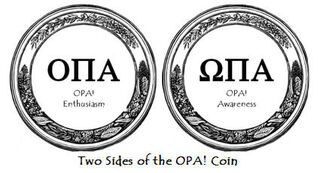Philosophy
Opa! A Greek Expression That Can Improve Your Life
A philosophy of living and way of looking at the world.
Posted April 9, 2022 Reviewed by Lybi Ma
Key points
- The search for meaning is the primary intrinsic motivation of human beings.
- Meaning is a key driver of engagement, resilience, health, and well-being.
- There is much to learn from the ancient Greeks about how to live with joy and meaning.

Especially against the backdrop of the last two years, more and more people have been telling us that they feel stressed, disengaged, disconnected, unfulfilled, fearful, and overwhelmed. In increasing numbers they’ve also revealed that they want to feel hopeful, inspired, and, importantly, want their lives to really matter. Much like Sisyphus, the Greek hero who was ordered by the gods to push a big rock uphill only to see it slip out of his hands at the last moment, living the “good life,” a philosophical term originally associated with Aristotle, for many people has become an endless—and joyless—undertaking.
The notion of the good life, in large part, can be viewed as the human quest for meaning, a formidable challenge that involves both making a living and making a life that has significance. To be sure, this seems to be easier said than done in light of the overwhelming evidence that points to the opposite: More people than ever before, in spite of obvious advances in our way and quality of life, appear to be experiencing some kind of existential angst or are lost in an empty space that the world-renowned psychiatrist Viktor Frankl described as an “existential vacuum.”
In short, the outer trappings of today’s societal affluence and influence are deceptive at best and hazardous to our health at worst. Power, influence, and money, in and of themselves, do not equate with authentic meaning as Dr. Frankl first warned us and as we since espoused in our book, Prisoners of Our Thoughts.1 The toxic fallout and collateral damage that come from people not finding meaning in their lives, including in their work lives, can be and usually are significant: decreases in engagement and resilience, suffering in health and well-being, and stifling of performance and innovation.
Now imagine if we had more meaning in our lives! Again, to quote Viktor Frankl, “Man’s search for meaning is the primary motivation in his life and not a ‘secondary rationalization’ of instinctual drives.”2 [Emphasis added] But Dr. Frankl was not the first great thinker to make such a claim about the search for meaning being the primary, intrinsic motivation of human beings. Let’s not forget the ancient Greek philosophers, like Aristotle, who talked about the human quest for meaning and living the “good life.” Indeed, thousands of years ago, Aristotle’s mentor, Plato, who himself was a friend of Socrates, made the following observation about human motivation: “Man, a being in search of meaning.”
Importantly, the ageless wisdom of the ancient Greeks has carried forward to the present day. Throughout our travels to Greece, we’ve observed and interacted with many Greeks—in all stages and walks of life—who have been able to find meaning in the midst of and despite the “crises” that had befallen their beloved country. We wanted to know about their secrets for finding meaning and remaining resilient during such especially tough times. And we really wanted to learn from the Greeks of today so that we could share their own brand of ageless wisdom for living and working with meaning with the rest of the world.
What we found was an easy-to-understand-and-remember concept that has deep roots in Greek antiquity and that can be meaningfully transformed into a “mantra for living and working” for the 21st century. Throughout Greece, we heard the word “Opa!” This common Greek saying has ancient roots dating back thousands of years ago to the writings of Homer, revered as the greatest ancient Greek epic poet and author of the classic works of literature, The Iliad and the Odyssey.
“Opa!” is a Greek expression that is heard often in the celebration of life. Most likely, you’ve heard it at a restaurant (Greek or not) when someone broke a plate—on purpose or unintentionally. Or you’ve heard it at a wedding or Greek festival where people are dancing. Or perhaps you’ve watched a Greek-themed movie during which the expression is used in some kind of enthusiastic celebration. You may have even been to Greece and heard it at various times during your visit.
“Opa!” is much more than simply a word. It also is a concept that carries with it deep and profound meaning. Meaning that can help all of us as we travel along life’s highway. Now let’s briefly explore the underlying meaning of the Greek expression “Opa!” and put it into a practical context so that you can use it for your own benefit—to build resilience, foster engagement, manage life transitions, and enjoy life to the fullest—in your personal life and in your work.

From its ancient roots, the Greek saying “Opa!” can be viewed as two sides of the same coin: one side (ΌΠΑ) refers to the uplifting, inspiring, enthusiastic expression that is often heard during some kind of celebration (a manifestation of “kefi” or spirit); the other (ΏΠΑ) refers very seriously to the human need to remain alert, warn ourselves and others, look out for any possible “danger” in one’s path, and be more awake to life’s potential, unlimited opportunities.3 Like the holistic concept of the yin and yang in Chinese philosophy, both sides of the Greek concept of “Opa!” are interdependent and are needed to achieve our highest potential.
We’ve built upon the ancient roots of this powerful, meaning-focused concept and formed an acronym using the anglicized letters of the Greek word “Opa!” This acronym, as mentioned above, provides a useful mantra (and formula) for living and working with meaning for everyone. In brief, the letter “O” refers to the basic human need to “Connect Meaningfully with Others”; the letter “P” refers to the basic human need to “Engage with Deeper Purpose”; and the letter “A” refers to the basic human need to “Embrace Life (all of life) with Attitude.” Others, Purpose, Attitude! O, P, A! “OPA!”4
Through the expression of “Opa!” the ancient and modern-day Greeks may have inadvertently revealed the true secret to living the “good” life after all.
References
*I would like to acknowledge the insightful and inspirational contributions to this post by Elaine Dundon, my “partner on the road” and coauthor.
1. Alex Pattakos and Elaine Dundon (2017). Prisoners of Our Thoughts: Viktor Frankl’s Principles for Discovering Meaning in Life and Work, 3rd edition. Oakland: Berrett-Koehler Publishers.
2. Viktor E. Frankl (1992). Man’s Search for Meaning: An Introduction to Logotherapy, 4th edition. Boston: Beacon Press, p. 105.
3. There are two letters in the Greek alphabet that represent the single English letter “O”: “Ο” (omicron) and “Ω” (omega), each of which has different origins, derivations, interpretations, and applications.
4. For more details about the origin and development of the “OPA!” concept, see: Alex Pattakos and Elaine Dundon (2015). The OPA! Way: Finding Joy & Meaning in Everyday Life & Work. Dallas: BenBella Books. This concept was incorporated as an extension of Viktor Frankl’s psychotherapeutic approach in the 3rd edition of our international bestselling book, Prisoners of Our Thoughts, and built into the foundation of the discipline of MEANINGology®, the study and practice of meaning in life, work, and society.




